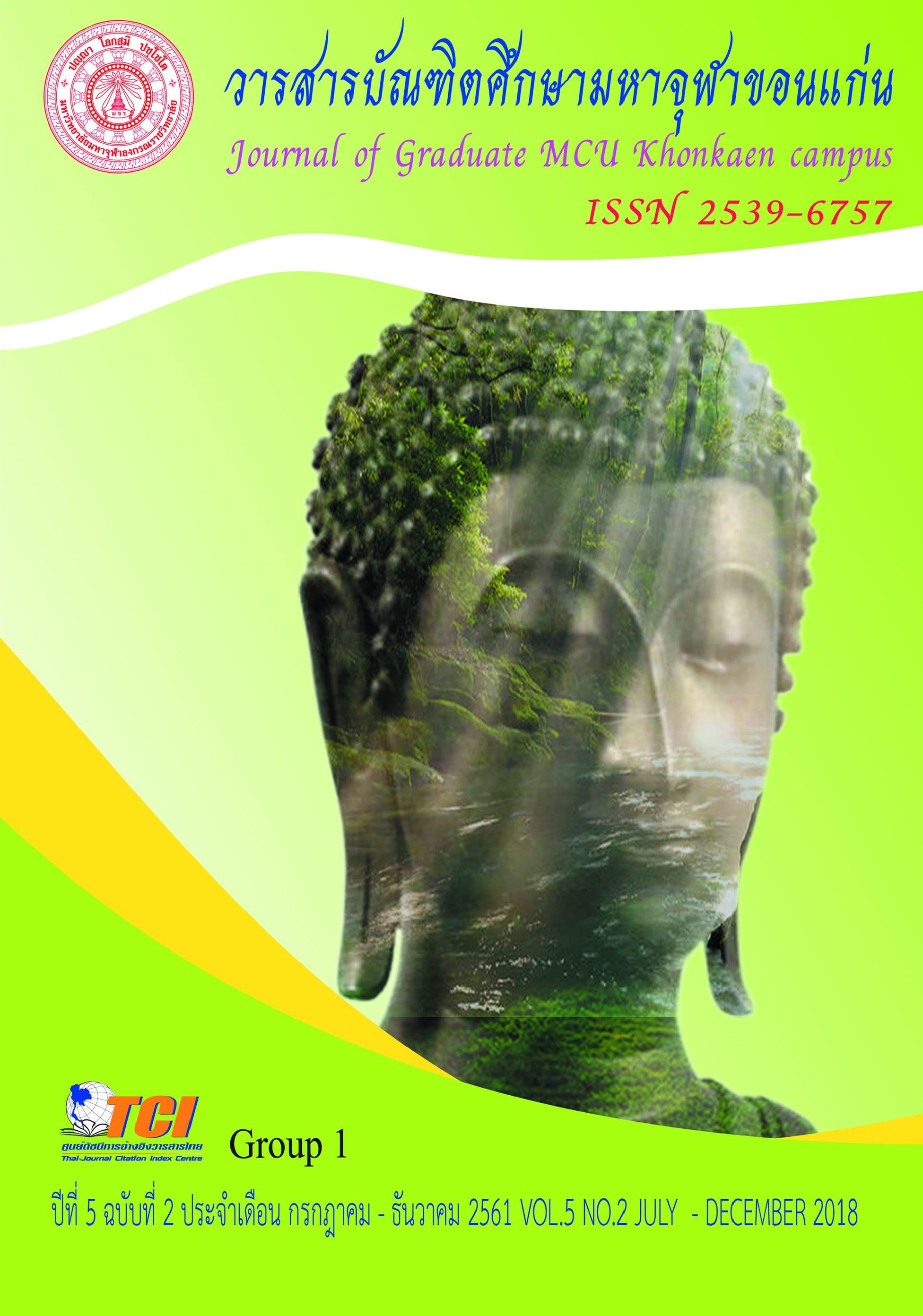การพัฒนารูปแบบการบริหารงานวิชาการของโรงเรียนพระปริยัติธรรม แผนกสามัญศึกษาสู่เกณฑ์มาตรฐาน
Main Article Content
บทคัดย่อ
บทความนี้เป็นส่วนหนึ่งของดุษฎีนิพนธ์เรื่อง“การพัฒนารูปแบบการบริหารงานวิชาการของโรงเรียนปริยัติธรรม แผนกสามัญศึกษา สู่เกณฑ์มาตรฐาน”มีวัตถุประสงค์เพื่อ3 ข้อ ดังต่อไปนี้ คือ 1) เพื่อศึกษาสภาพการบริหารงานวิชาการของโรงเรียนพระปริยัติธรรม แผนกสามัญศึกษา 2) เพื่อพัฒนารูปแบบการบริหารงานวิชาการของโรงเรียนพระปริยัติธรรม แผนกสามัญศึกษา สู่เกณฑ์มาตรฐาน 3) เพื่อนำเสนอรูปแบบการบริหารงานวิชาการของโรงเรียนพระปริยัติธรรม แผนกสามัญศึกษา สู่เกณฑ์มาตรฐาน งานวิจัยนี้เป็นงานวิจัยเชิงคุณภาพ (Qualitative Research) โดยการวิจัยจากเอกสาร (Documentary Research) การสัมภาษณ์เชิงลึก (In-depth Interview) จากผู้ให้ข้อมูลสำคัญ (Key Informants) การสนทนากลุ่ม (Focus Group Discussion) และตรวจสอบผลการวิจัยโดยการสัมมนาอิงผู้เชี่ยวชาญ (Connoisseurship)
ผลการศึกษาวิจัยพบว่า
1. สภาพการบริหารงานวิชาการของโรงเรียนพระปริยัติธรรม แผนกสามัญศึกษา ในปัจจุบัน พบว่า โรงเรียนพระปริยัติธรรม แผนกสามัญศึกษา จำนวนสี่ร้อยกว่าโรง มีบริบทที่แตกต่างกันมาก มีข้อเด่นข้อด้วยแตกต่างกัน แต่ขาดการประยุกต์ และการนำข้อเด่นข้อด้อยเหล่านั้น มาปรับใช้อย่างมีประสิทธิภาพ และให้เกิดประสิทธิผล ในการบริหารงานวิชาการอย่างจริงจัง ซึ่งปัญหาการบริหารงานวิชาการของโรงเรียนปริยัติธรรม แผนกสามัญศึกษา แบ่งออกได้เป็น 5 ประเด็น คือ 1) ด้านคุณภาพผู้เรียน 2) ด้านคุณภาพผู้บริหารงานวิชาการ 3) ด้านคุณภาพครูผู้สอน 4) ด้านคุณภาพหลักสูตร 5) ด้านคุณภาพสิ่งแวดล้อม
2. การพัฒนารูปแบบการบริหารงานวิชาการของโรงเรียนพระปริยัติธรรม แผนกสามัญศึกษา สู่เกณฑ์มาตรฐานนั้น ผลการศึกษาพบว่า ประกอบด้วย 5 องค์ประกอบหลัก และแต่ละองค์ประกอบหลัก ประกอบด้วยองค์ประกอบย่อย และกิจกรรม ดังนี้ องค์ประกอบที่ 1 ด้านคุณภาพผู้บริหาร และการบริหารงานวิชาการ มี 4 องค์ประกอบย่อย 29 กิจกรรม โดยเน้น ภาวะผู้นำ ความรับผิดชอบ และหลักธรรมภิบาล องค์ประกอบที่ 2 ด้านคุณภาพครูผู้สอน มี 4 องค์ประกอบย่อย 7 กิจกรรม ได้แก่ ความรับผิดชอบในหน้าที่ การพัฒนาสื่อการสอน และการจัดการเรียนการสอนแบบมีส่วนร่วม องค์ประกอบที่ 3 ด้านคุณภาพหลักสูตร มี 4 องค์ประกอบย่อย 8 กิจกรรม ได้แก่ ผลลัพธ์ด้านการเรียนรู้ และความพึงพอใจทางด้านวิชาการของผู้เรียน องค์ประกอบที่ 4 ด้านคุณภาพสิ่งแวดล้อม มี 4 องค์ประกอบย่อย 11 กิจกรรม ได้แก่ สภาพแวดล้อมในการทำงาน องค์ประกอบที่ 5 ด้านคุณภาพผู้เรียน มี 4 องค์ประกอบย่อย 16 กิจกรรมได้แก่ ความผูกพันในสถาบัน มีความรู้ เทคโนโลยี และสารสนเทศเป็นอย่างดี
The objectives of this research were; 1. to study the status of academic affairs administration of Phrapariyattidhamma schools, general education division, 2. to develop a model of academic affairs administration of Phrapariyattidhamma schools, general education division, to standard criteria, and 3. to propose the model of academic affairs administration of Phrapariyattidhamma schools, general education division, to standard criteria.
The data were collected from documents, in-depth interview, focus group discussions and connoisseurship.
The results of the study found that:
1.Phrapariyattidhamma schools, general education, have different contexts, advantages and disadvantages, but lack of the application of those factors in school academic affairs administration effectively. The problems in academic affairs administration of Phrapariyattidhamma schools, general education, can be divided into 5 groups; 1. Students’ qualification, 2.Qualification of academic affairs administrators, 3.Teachers’ qualification, 4. Curriculum qualification, and 5. Environment qualification.
2. The development of the model of academic affairs administration of Phrapariyattidhamma schools, general education division, to standard criteria consists of 5 main factors. Factor 1: Administrator’s qualification and academic affairs administration consist of 4 sub-factors and 29 activities focusing on leadership, responsibility and good governance. Factor 2: Teachers’ qualification consists of 4 sub-factors and 7 activities; duty performance responsibility, instructional media development and participatory learning management. Factor 3: Curriculum qualification consists of 4 sub-factors and 8 activities, learning outcome and academic satisfaction of the learners. Factor 4: Environment qualification consists of 4 sub-factors and 11 activities, workplace environment and atmosphere. Factor 5: Students’ qualification consists of 4 sub-factors and 16 activities, institutional relation, knowledge, and information technology.
Article Details
เอกสารอ้างอิง
Office of the Education Council : ONEC. (2007). Synthesis Report Factors affecting the quality of Thai education. Bangkok : VTC Communications. Patipimpakom P. (2007). Leadership Styles and Effectiveness of Administrators of Basic Education Private School. Doctoral thesis. Graduate School : Silpakorn University. Wonganuttararot, P. (2011). Academic Administration. Bangkok : Bangkok Communication Center.

